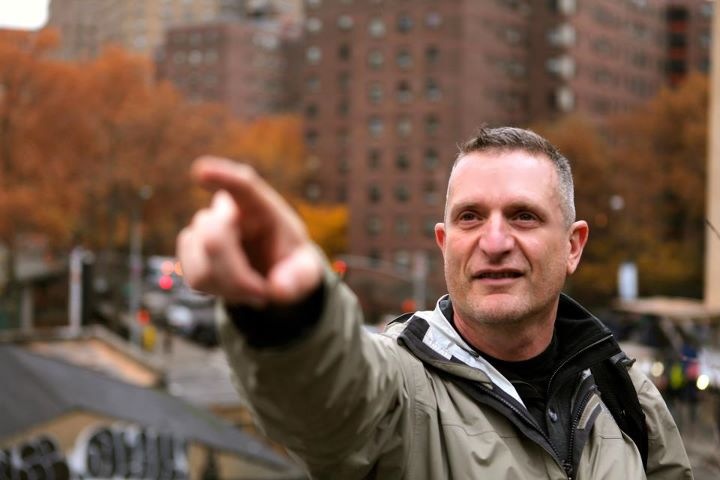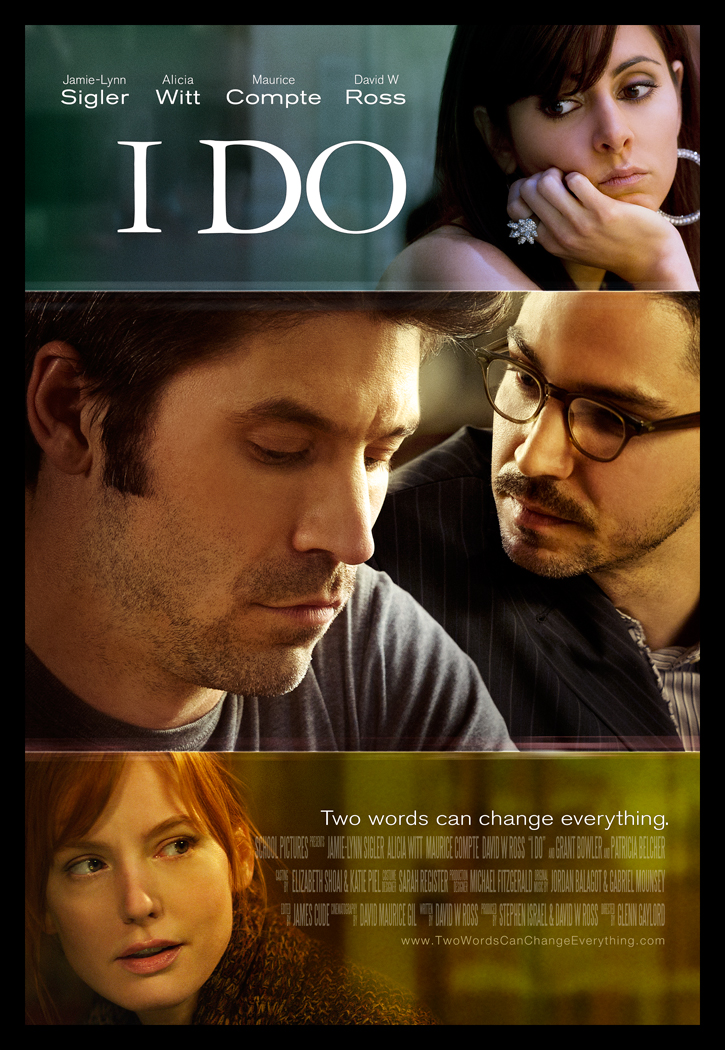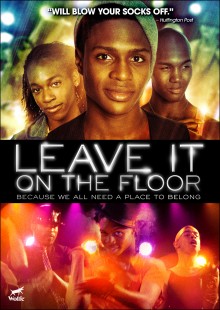

Glenn is a noted director, having helmed the new indie hit I Do, which is receiving accolades and awards at gay film festivals around the world, as well as the gay cult fave Eating Out 3: All You Can Eat. Prior to I Do Glenn wrote the screenplay and lyrics for the musical film Leave It on the Floor, which also received great acclaim and is newly out on DVD.
Recently Glenn took a break from his busy schedule to share with me more about his films, his life, and his views on the gay community.
Glenn, thanks for taking the time to chat! First of all, congratulations on your new film, I Do, which I'm hearing great things about. What can you tell us about it?
I Do is an intense romantic drama about a gay Englishman in New York who, despite wanting to stay to help raise his niece, faces an expired visa. He marries his lesbian best friend, Ali, played by Jamie-Lynn Sigler of The Sopranos fame, but things get complicated fast when he meets and falls for a sexy Spaniard. The film touches upon some very profound issues of our time, the Defense of Marriage Act, and how even though gay people can get married in certain states in this country, immigration is a federal right. So even if a gay person legally marries someone, it doesn't grant citizenship, because of DOMA. All told, despite its hot-button topicality, this is the very human story about a man who has to decide whose life he's living.
How did you become involved with I Do?
Producer Stephen Israel and I have collaborated on projects in the past, and truth be told, I wouldn't have a career were it not for him. As a former programmer with the Slamdance Film Festival, he went to bat for my very first short, Lost Cause, and got it into that fest. He's like a brother to me, that guy! Over the years he had told me about this project he was developing with screenwriter/actor David W. Ross, who, like most talented people, decided not to wait around for great roles but wrote one for himself instead. All I knew about this film was that it was about gay marriage, so in my mind it was one of those dopey comedies where the poster is of two grooms on a wedding cake throwing frosting at each other. Hilarity ensues! I had met David a few times through Stephen and had really liked the acting work he did in the Sundance Award-winner Quinceanera. Finally, when things seemed to be heating up with the project, I asked to read the script, and I was blown away. Completely devoid of camp, this was a mature, human, funny, terse, moving story.
Very different from other work you've done!
Now, I love my crazy gay comedies as much as the next guy. I did, after all, direct an Eating Out movie! But here was a film with gay and straight characters who looked and acted like people I actually knew. This film was more in line with the types of films I wanted to make, those very James L. Brooks/Cameron Crowe explorations of what I like to call "human quirk."
How did you actually get involved with the film?
Well, one night, at one of Stephen's dinner parties, David Ross got down on one knee and proposed to me that I direct I Do. It was hilarious, extremely apropos, and also one of the sweetest moments of my life. The icing on the cake was having the privilege of working with fantastic actors I've been a fan of, such as Jamie-Lynn Sigler, Alicia Witt, Maurice Compte, and Grant Bowler. You never know what you're going to get when you put a bunch of people together, and we were so lucky to have a cast of such kind and dedicated actors.
 Tell me more about the reaction at these festivals.
Tell me more about the reaction at these festivals.
We've been thrilled by the critical and audience responses to the film. We had a sneak preview of the unfinished film at San Francisco's Frameline fest back in June, and it was there that we knew we had something special on our hands. This was a packed house openly laughing and crying in equal measure. Our world premiere took that to the next level, as we screened at the outdoor Ford Amphitheatre in Hollywood as part of Outfest's 30th anniversary. We had a sold-out audience in a 1,500-seat venue, our cast and crew and many loved ones present. In the crowd I spotted my favorite UCLA Film School professor, Bob Rosen, who went on to become the dean. From him I learned my taste in film, my love for storytelling, and truly found my voice. One of the great honors of my life was being able to publicly acknowledge him from the stage of our premiere. I look forward to being at as many festival screenings as possible as we launch our little baby out into the world. As a filmmaker you learn so much from listening to audiences from all over.
I understand writer and star David W. Ross won the Rising Star Award at Philadelphia's QFest.
Yes! How cool is that? Luckily, he was able to go to Philadelphia and soak in that honor.
With two features under your belt as director and another as screenwriter, which do you enjoy more: directing or screenwriting?
I love it all. I've written and directed my own films, directed scripts written by others, and written scripts for directors, and each have been incredibly valuable, fulfilling experiences. As a writer, I spend a lot of time sitting alone in cafes pouring my heart out into my keyboard. When I finish a script, I've been through such a quiet period that I'm dying to get out on a set with a bunch of passionate people and the chaos and live in that traveling-circus atmosphere for a while. The editing process is a great way to come down from that, since you're sitting in a dark room for a few months with just a couple of people. It's the circle of life, indie-film style! It's equally wonderful to write that perfect line as it is to work with amazing actors and crew.
With Leave It on the Floor, not only did you have to put yourself in the mindset of a different culture, the ball culture depicted in films such as Paris Is Burning, but you also wrote the lyrics.
Looking back at my life, I've always had the ability to dive into various cultures. In high school, which is the ultimate sea of cliques, I had friends from all of them, especially the outcasts. My parents encouraged diversity in our lives, and when I was 12 I was selected to represent the United States in a cultural-exchange summer camp in the Philippines. It truly changed my life, as I was able to see firsthand that there was a massive world out there, far different than what I'd seen from my small-town Ohio bedroom window.
That's a great perspective to have.
That same sense of openness and wonder is how I approached Leave It on the Floor. I'm not an African American from the ball culture, yet I strove to enter this new environment and find the common humanity. Some of my favorite stories come from an outsider perspective. Look at Ang Lee's career. I don't think Sense and Sensibility or Brokeback Mountain would feel as special as they do if they had been made by insiders in those worlds. I think he saw things many people who are too close to the subject matter might overlook.
 How did that outsider sensibility help inform the screenplay?
How did that outsider sensibility help inform the screenplay?
When I started writing Leave It on the Floor, director Sheldon Larry and I sat down and imagined what was in each character's head. What are their aspirations? What do they think of themselves? Musical numbers give us the opportunity to present their inner lives. The first lyrics I wrote were for the opening song, "The Loser's List." Our hero, Brad, is kicked out of his house for being gay and is forced to live on the streets. No surprise that he'd be feeling defeated at that particular moment, so I figured he'd be punishing himself inside by checking off all of the reasons he had ended up in this place. Another character has this dream that Justin Timberlake is going to swoop down of out the sky and hire him to choreograph his next music video. Well first off, don't we all want Justin Timberlake to record some more music and dance around in his videos?! This dream is what fueled the musical number "Justin's Gonna Call," which has turned into an audience favorite. I grew up in a very musical household, and I've been writing lyrics since I was very young. To write an entire musical film was a dream come true, and I'm very grateful that Sheldon Larry presented me with this opportunity.
Prior to your burst of artistic endeavors, you were primarily focused on HIV/AIDS education. Back when we worked at AIDS Project Los Angeles, AIDS was still killing people left and right. These days, many view it as a manageable disease -- and yet people are still dying.
It's funny: There's another example of how I've been able to dive into other cultures. My work with APLA brought me into many underserved, underrepresented communities who all shared this one little virus in common. I learned so much from seeing firsthand how marginalization can affect access to health care, and how it can affect longevity. White people with insurance tended to do better living with HIV than others. I'm proud that I was on the front lines helping people on Skid Row, in jails and prisons, in poorer neighborhoods, and even those with more privileged lives. I helped educate people of all ages about transmission, prevention, and treatment for over 14 years, and I wouldn't trade it for anything. Although I put my own filmmaking aspirations on hold, I can proudly answer the question "where were you when so many people were dying?" by responding, "I was right there with them doing everything I could to make life better."
What's your take on the current state of HIV/AIDS within the gay community?
It's sad that with distance and time the virus is no longer part of the cultural zeitgeist. There's a tremendous amount of stigmatization within the community. You see it in online postings, where people say such things in their profiles as, "I'm HIV- and clean, UB2," which implies that people living with HIV are dirty. So many younger people have never met a person with HIV before, so it's understandable that the unknown would be treated so callously. That's why I'm particularly happy that the Stigma Project exists. I am so grateful that they're out there trying to educate people about HIV and raise awareness about the great divide we're experiencing in our community.
Like me, you are what I'd call a "professional gay," meaning we eat/live/work/sleep gay. What do you perceive as the biggest challenges our community faces?
The LGBT community has been facing an uphill battle for so long that it's been really encouraging to live in a time where our president supports gay marriage, where the majority of the people in this country support it. I'm often disappointed in the short memories we as a country tend to have. All you have to do is look to the gay community in the '80s and '90s to see the true definition of family. We took care of each other, we organized, we fought the FDA in order to speed up their drug-approval process. Whoever said that gay people don't make ideal families need only look back at that time to see otherwise.
We've made a lot of progress since then.
Yes, but there have also been obvious setbacks. I don't want to harp on the gay marriage issue, because I think there is a larger issue at hand. If you look at the history of marginalized people, they often turn on each other because they feel so helpless against the status quo. I see it within the gay community, and it looks just like high school all over again.
What do you mean?
There are times I feel we need to treat each other better, or else we're just playing into the hands of those who think we don't deserve equality. It all starts with simple gestures. This applies to straight people, too, so listen up! Next time you're out in your community, strike up a conversation with the last person you would normally approach. Keep it friendly and you may make a wonderful friend or learn something. Not to sound all Burning Man, but we really can make this world better if we stop, listen, and smile more often.
So, what's next for Mr. Glenn Gaylord? Do you have a project in mind?
I'm currently seeking representation and would love the right agent and manager to champion me. I've got this bucket list where I want to write and/or direct a project in every genre. So far I've done comedy, musical, drama, documentary, and sitcom. There are still quite a few more to go! Also, I'm in a really creative place right now, sprucing up not one, not two, but three scripts I've written. I've learned so much from making films over the past few years that I'm able to take a critical look at my own writing and kick it up a notch. I've also established my own script consult business for those who want real advice from someone who's actually done it. Obviously, I've got lots of irons in the fire!
Again, congratulations on I Do. Where can folks see it?
Our next stop is as the closing-night film at the Long Beach Q Film Festival, this Sunday, Sept. 16, at 8:30 p.m., and other screenings are listed on the film's website. Folks can also follow the film on Twitter @iDoTheMovie or like the movie's page on Facebook.
Thanks, Glenn. I can't wait to see what you do next!
* * * * *
Both Leave It on the Floor and Eating Out 3 are now available on DVD. Director and screenwriter Glenn Gaylord can be found on Twitter and Facebook, and on his own website.
This piece originally appeared on KerganEdwards-Stout.com and the Bilerico Project.
